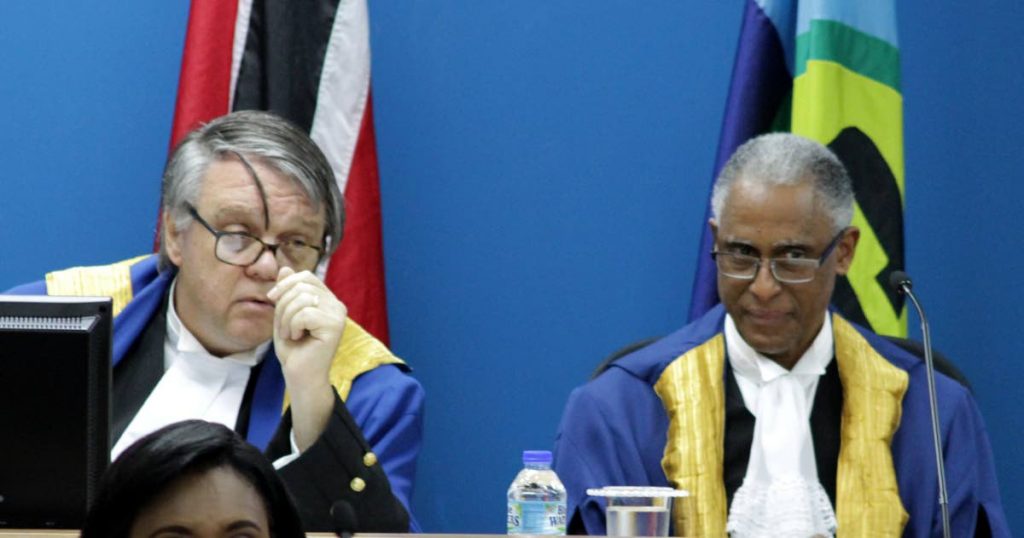CCJ gives PPP/C Guyana election upper hand

GUYANA’s chief election officer’s report of June 23, which slashed over 115,000 votes, has been invalidated by the Caribbean Court of Justice (CCJ).
On Wednesday, president of the Trinidad-based court Justice Adrian Saunders also held that the Court of Appeal’s ruling that inserted the word “valid” in the consideration of votes for the election of a President was also invalid.
The appellate court’s ruling was set aside along with CEO Keith Lowenfield’s report to Guyana’s Election Commission (GECOM).
Saunders also said it was now up to GECOM to secure a report from the CEO based on the recount of votes.
Lowenfield submitted what he said was a report of the “valid and credible votes” at the March 2 polls to GECOM, showing a victory for the incumbent APNU+AFC, after invalidating almost 25 per cent of the votes.
Saunders read out a summary of the judgment which, he said, was unanimous.
Five judges of the CCJ sat on the appeal. They were: Saunders and Justices Jacob Wit, Maureen Rajnauth-Lee, Denys Barrow, and Peter Jamadar.
Saunders also addressed the delay in declaring a winner since the March 2 elections.
“As Guyana’s final court, we cannot, however, pretend to be oblivious of events that have transpired since December 2018. Indeed, we have had to pronounce on some of those events. It has been four months since the elections were held and the country has been without a Parliament for well over a year. No one in Guyana would regard this to be a satisfactory state of affairs. We express the fervent hope that there would quickly be a peaceable restoration of normalcy,” Saunders said.
Earlier, he said free and fair elections were the lifeblood of any true democracy and the matter before it was of “considerable concern” to the people of Guyana.
The CCJ was asked to determine if the Court of Appeal had the jurisdiction to hear the challenge of the validity of the polls before a president was declared by the Guyana Elections Commission (GECOM).
Specifically, the court had to determine if the Court of Appeal’s decision was final and if it (the CCJ) had the jurisdiction to intervene.
Saunders said what the Court of Appeal did was to embark on an exercise of interpreting Order 60, the recount order, and then apply it to the clear words of 177 (2) (b).
Article 177 provides that each list of candidates must designate a president and deems a vote for a list to be a vote for the presidential candidate named in the list.
Saunders said the Constitution required no refinement.
Guyana’s main opposition, People’s Progressive Party/Civic (PPP/C) filed the appeal at the CCJ and also asked for an interpretation of the words “more votes are cast.”
“The Court of Appeal in its decision ordered that the words are to be interpreted as meaning “more valid votes are cast.”
The court also ruled that GECOM had a responsibility to determine the final credible count based on quantitative and qualitative assessments of the observation report, in keeping with provisions of the original order and in the final paragraph of the amended order.
The PPP/C’s political leader Bharrat Jagdeo and its presidential candidate Irfaan Ali argued that the Court of Appeal did not have the jurisdiction to hear the matter.
The matter before Guyana’s Court of Appeal was mounted by Eslyn David, a private citizen.
Saunders said there was nothing in David’s application to trigger the Court of Appeal’s jurisdiction and there was already a transparent process to weed out invalid votes.
He said by inserting the word “valid” in Article 177(2), the Court of Appeal trespassed on the High Court’s jurisdiction and invited the CEO to disenfranchise tens of thousands of electors.
The recount showed that there were 460,352 valid votes with the PPP/C securing a majority of 233,336 votes, which would have made up 33 seats in the National Assembly.
The Coalition APNU+AFC received 217,920 votes, and 31 seats, while other parties which contested received 5, 214 votes, entitling to a seat in the 65-seat parliament.
Lowenfield’s June 23 report reduced the total votes cast to 344,508, slashing 115,844 votes.
In the report, the ruling coalition was assigned 171,825 votes and 33 seats in the National Assembly, while the PPP/C was given 166,343 and 31 seats in the National Assembly.
The other parties also saw their votes being slashed but they maintained their one seat in the legislature.
The PPP/C has said it won the last elections based on the national recount that ended on June 9.
But the APNU has said that there were several irregularities and anomalies and wants the polls to be annulled.
A high-level Caricom team, which served as observers for the national vote recount, said they found no proof of electoral fraud.
Jagdeo, at a media briefing shortly after the CCJ delivered its decision, said GECOM and the CEO now had clear guidance from Guyana’s final appellate court.
“Let us see if he will continue to act unlawfully or act in guidance of the CCJ,” Jagdeo, general secretary of the PPP/C said.
“A lot depends on the next few days,” he said, adding that they expected GECOM’s chairman, retired Justice Claudette Singh, to convene a meeting and move the process speedily to declare a President.
Jagdeo said the international community, which has been calling for an end to the election imbroglio, can now feel bolstered and vindicated in their advocacy.
President David Granger, who also spoke with reporters on Wednesday, said, “We will continue the fight to make sure that your votes are counted.” He insisted the APNU had evidence of irregularities.
“The CCJ has not allowed the position that our Court of Appeal has taken, but it means that the matter will now have to go back to the Election Commission.”

Comments
"CCJ gives PPP/C Guyana election upper hand"